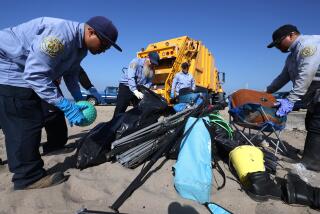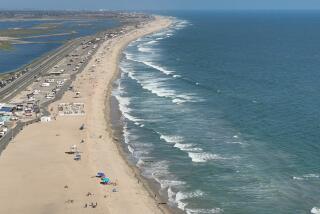County Cites Concerns Over Safety, Liability at Dockweiler : Hang-Glider Ban at Beach May Be Forever
Twenty years ago, the sport of hang gliding was born on the low, sandy bluffs of Dockweiler State Beach, the sport’s enthusiasts say.
Since then, the area around Dockweiler has been built up, but the spot remains ideal--particularly for beginners--to strap on a harness and glide through the air in what is essentially a large kite.
Now it is questionable whether hang gliders will ever soar over the beach again. Last September, the county Department of Beaches and Harbors ordered an end to “any and all hang gliding” at Dockweiler, citing a city ordinance that confines it to designated areas. Although the city Parks and Recreation Commission recently designated Dockweiler a hang-gliding area, the county, which operates the beach, still prohibits it because of safety and liability concerns.
“Twenty years ago there were very few people asking about liability,” said Dennis Morefield, a spokesman for Supervisor Deane Dana, whose 4th District includes Dockweiler. “Now there are quite a few people asking questions about it.”
Joe Greblo of Tujunga, who runs a hang-gliding school in Van Nuys and used to take beginning students to Dockweiler, said he fears that county officials are raising obstacles in the hope that the hang gliders will go away. He said the county would prefer to have profitable activities, such as a recreational vehicle park at the best hang-gliding location, a bluff south of Imperial Highway across from the Hyperion Sewage Treatment Plant.
Steady Winds Off Ocean
A leader in the effort to bring hang gliding back to Dockweiler, Greblo said the site is ideal because it has steady winds off the ocean, soft sand to cushion rough landings and few sunbathers to worry about because of sewage smells and aircraft noise from nearby Los Angeles International Airport.
“I’m now coming to the conclusion that we are not going to get anywhere,” he said. “They all say they are sympathetic, yet we can’t be there.”
R. L. Dean, a contract administrator with the revenue division of the county Department of Beaches and Harbors, acknowledged that hang gliding has been going on at Dockweiler since 1966 but said, “It reached a point where we became aware of the activity and it was necessary to do something because of the liability.”
Dean said hang-gliding enthusiasts illegally parked on the beach or on busy Vista Del Mar and carried the 50- to 60-pound gliders across the street to the beach, creating a liability problem if someone is hit by a car. He said there is also concern that the hang gliders may crash into bicyclists on the bike path on the beach below the bluff. Such an accident has never occurred, county officials acknowledged.
Dean said the county Public Works Department is conducting a study to determine whether a new parking lot can be built and if the bike path can be moved farther away from the hang-gliding area.
The report is expected to be completed in four to six months, Dean said. Whether hang gliding will return to Dockweiler will be determined after the report is submitted.
If all the improvements are made and “if all the hang-gliding schools are as capable and well-trained as Greblo’s, I just can’t foresee any problems,” Dean said.
But Greblo is not optimistic.
He said a nearby parking lot that had been used by hang-glider pilots was converted for use by recreational vehicles, forcing the pilots to park half a mile farther from the bluff.
Greblo said the county refused his request that part of the RV lot be designated an unloading area where pilots could drop off their equipment.
‘Won’t Be Considered’
“They are saying we can’t fly because we don’t have a parking lot and they won’t even give us an unloading area,” Greblo said.
“It won’t even be considered,” Dean confirmed. “The RV park is going to be for RVs.”
Greblo also disputes the concern that bicyclists on the beach path may be in danger.
“We don’t even go out that far,” he said, noting that the path is about 200 feet from the bluff and that the hang gliders come down no closer than 50 feet to the bike path.
Greblo also said the U.S. Hang Gliding Assn. recently increased liability insurance for its members to $1 million from $500,000.
“That should be more than enough,” Greblo said, noting that the state Department of Parks and Recreation last year agreed to accept $500,000 in liability insurance for people who use hang gliders at state parks.
Dean said a decision has not been made on how much liability insurance to require, but he said he would expect no less than $1 million.
However, even if the county report concludes that its concerns can be corrected, the bigger question is whether the county will spend the money to build a parking lot and move the bike path.
Dean said that budget cuts for beach maintenance have placed priority on projects that can generate money to pay for themselves and for general beach maintenance.
City help may be available. Charles Stewart, an aide to Los Angeles Councilwoman Pat Russell, whose 6th District includes Dockweiler, said Russell supports reopening the beach for hang gliding and has “made a commitment to make the necessary improvements” to “enable hang gliding to return to the site of its birth.”
More to Read
Sign up for The Wild
We’ll help you find the best places to hike, bike and run, as well as the perfect silent spots for meditation and yoga.
You may occasionally receive promotional content from the Los Angeles Times.






